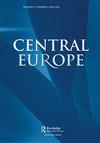Death-Agony and Birth Pangs: Inheritors of the Grand Duchy of Lithuania under German Occupation 1915–1918
IF 0.1
2区 历史学
Q2 HISTORY
引用次数: 0
Abstract
ABSTRACT The Ober-Ost administration instated in 1915 covered a fragment of the former Grand Duchy of Lithuania; a territory contested by Germany and Russia, inhabited by a nationally and religiously diverse society, with the Polish-Jewish city of Wilno as its central point. The German policies exploited the national aspirations of both the Lithuanians and the Belarusian leaders to dissolve the former Polish-Lithuanian Commonwealth. Contrary to the Belarusian leaders focused on short-term benefits, the Lithuanian politicians proved more resourceful in using the seemingly pro-Lithuanian and pro-Belarusian policies towards obtaining their own nation state. The Germans discriminated the Lithuanian Poles in terms of rights to political activity, even when conducted without subsidies from the occupier. The disunity with the local society progressed and benefited the supporters of Polish national policies, however few in Wilno in 1915. The German authorities successfully pushed the Lithuanian Poles, so far seeking consensus with other local communities, towards merging with the post-war Polish state announced by the Act of 5th November 1916. The Germans backed the creation of small, interdependent Lithuanian and Belarusian states. The Lithuanians however issued a second declaration of independence (16.02.1918), thus becoming the only ones to benefit from Germany's military defeat.死亡的痛苦和出生的阵痛:1915-1918年德国占领下立陶宛大公国的继承者
1915年成立的奥伯-奥斯特政府覆盖了前立陶宛大公国的一小部分;这是德国和俄罗斯争夺的领土,居住着一个民族和宗教多样化的社会,波兰犹太人城市威尔诺是它的中心。德国的政策利用了立陶宛人和白俄罗斯领导人解散前波兰立陶宛联邦的民族愿望。与白俄罗斯领导人关注短期利益相反,立陶宛政治家在利用看似亲立陶宛和亲白俄罗斯的政策来建立自己的民族国家方面表现得更加机智。德国人在政治活动权利方面歧视立陶宛波兰人,即使在没有占领者补贴的情况下也是如此。与当地社会的不团结使波兰国家政策的支持者受益,但在1915年的威尔诺很少。德国当局成功地推动立陶宛波兰人与其他当地社区达成共识,并于1916年11月5日通过法案宣布与战后波兰国家合并。德国支持建立相互依存的立陶宛和白俄罗斯两个小国。然而,立陶宛人发表了第二次独立宣言(1918年2月16日),从而成为唯一一个从德国军事失败中受益的人。
本文章由计算机程序翻译,如有差异,请以英文原文为准。
求助全文
约1分钟内获得全文
求助全文
来源期刊

Central Europe
HISTORY-
CiteScore
0.20
自引率
0.00%
发文量
7
期刊介绍:
Central Europe publishes original research articles on the history, languages, literature, political culture, music, arts and society of those lands once part of the Habsburg Monarchy and Poland-Lithuania from the Middle Ages to the present. It also publishes discussion papers, marginalia, book, archive, exhibition, music and film reviews. Central Europe has been established as a refereed journal to foster the worldwide study of the area and to provide a forum for the academic discussion of Central European life and institutions. From time to time an issue will be devoted to a particular theme, based on a selection of papers presented at an international conference or seminar series.
 求助内容:
求助内容: 应助结果提醒方式:
应助结果提醒方式:


